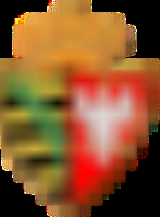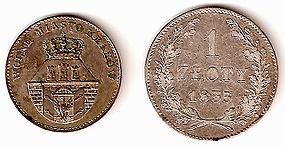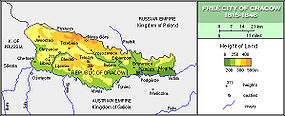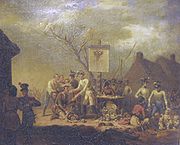
Free City of Kraków
Encyclopedia



City-state
A city-state is an independent or autonomous entity whose territory consists of a city which is not administered as a part of another local government.-Historical city-states:...
created by the Congress of Vienna
Congress of Vienna
The Congress of Vienna was a conference of ambassadors of European states chaired by Klemens Wenzel von Metternich, and held in Vienna from September, 1814 to June, 1815. The objective of the Congress was to settle the many issues arising from the French Revolutionary Wars, the Napoleonic Wars,...
in 1815, and controlled by its three neighbours (Russia
Russian Empire
The Russian Empire was a state that existed from 1721 until the Russian Revolution of 1917. It was the successor to the Tsardom of Russia and the predecessor of the Soviet Union...
, Prussia
Kingdom of Prussia
The Kingdom of Prussia was a German kingdom from 1701 to 1918. Until the defeat of Germany in World War I, it comprised almost two-thirds of the area of the German Empire...
, and Austria
Austrian Empire
The Austrian Empire was a modern era successor empire, which was centered on what is today's Austria and which officially lasted from 1804 to 1867. It was followed by the Empire of Austria-Hungary, whose proclamation was a diplomatic move that elevated Hungary's status within the Austrian Empire...
) until 1846, when in the aftermath of the unsuccessful Kraków Uprising
Kraków Uprising
The Kraków Uprising of February 1846 was an attempt, led by Edward Dembowski, to incite a Polish fight for national independence. Even though most of Poland was part of the Russian Empire, the Polish risings were conducted mainly in Prussia and in the Austrian Empire.-History:Most of the...
it was annexed by the Austrian Empire. It was a remnant of the Duchy of Warsaw
Duchy of Warsaw
The Duchy of Warsaw was a Polish state established by Napoleon I in 1807 from the Polish lands ceded by the Kingdom of Prussia under the terms of the Treaties of Tilsit. The duchy was held in personal union by one of Napoleon's allies, King Frederick Augustus I of Saxony...
partitioned
Partitions of Poland
The Partitions of Poland or Partitions of the Polish–Lithuanian Commonwealth took place in the second half of the 18th century and ended the existence of the Polish–Lithuanian Commonwealth, resulting in the elimination of sovereign Poland for 123 years...
between the three states in 1815.
History
The Free City was formally established on May 3, 1815. The statelet received an initial constitution in 1815, revised and expanded in 1818, establishing significant autonomy for the city. The Jagiellonian UniversityJagiellonian University
The Jagiellonian University was established in 1364 by Casimir III the Great in Kazimierz . It is the oldest university in Poland, the second oldest university in Central Europe and one of the oldest universities in the world....
could accept students from the partitioned territory of Poland. The Free City thus became a center of Polish political activity on the territories of partitioned Poland.
During the November Uprising
November Uprising
The November Uprising , Polish–Russian War 1830–31 also known as the Cadet Revolution, was an armed rebellion in the heartland of partitioned Poland against the Russian Empire. The uprising began on 29 November 1830 in Warsaw when the young Polish officers from the local Army of the Congress...
of 1830–31, Kraków was a base for the smuggling of arms into the Russian-controlled Kingdom of Poland
Congress Poland
The Kingdom of Poland , informally known as Congress Poland , created in 1815 by the Congress of Vienna, was a personal union of the Russian parcel of Poland with the Russian Empire...
. After the end of the uprising the autonomy of the Free City was restricted. The police was governed by Austria, the election of the president had to be approved by all three powers. Kraków was subsequently occupied by the Austrian army from 1836 to 1841. After the unsuccessful Kraków Uprising
Kraków Uprising
The Kraków Uprising of February 1846 was an attempt, led by Edward Dembowski, to incite a Polish fight for national independence. Even though most of Poland was part of the Russian Empire, the Polish risings were conducted mainly in Prussia and in the Austrian Empire.-History:Most of the...
of 1846, the Free City was annexed by Austria on November 16, 1846 as the Grand Duchy of Cracow.
Geography and population
The Free City of Kraków was created from the south-west part of the Duchy of WarsawDuchy of Warsaw
The Duchy of Warsaw was a Polish state established by Napoleon I in 1807 from the Polish lands ceded by the Kingdom of Prussia under the terms of the Treaties of Tilsit. The duchy was held in personal union by one of Napoleon's allies, King Frederick Augustus I of Saxony...
(part of the former Kraków Department
Kraków Department
Kraków Department was a unit of administrative division and local government in Polish Duchy of Warsaw in years 1809–1815.Its capital city was Kraków and the area was further subdivided onto 10 powiats....
on left bank of the Vistula
Vistula
The Vistula is the longest and the most important river in Poland, at 1,047 km in length. The watershed area of the Vistula is , of which lies within Poland ....
river). The territory of the city comprised 1164–1234 km² (sources vary). It bordered the Russian Empire
Russian Empire
The Russian Empire was a state that existed from 1721 until the Russian Revolution of 1917. It was the successor to the Tsardom of Russia and the predecessor of the Soviet Union...
, the Kingdom of Prussia
Kingdom of Prussia
The Kingdom of Prussia was a German kingdom from 1701 to 1918. Until the defeat of Germany in World War I, it comprised almost two-thirds of the area of the German Empire...
and the Austrian Empire
Austrian Empire
The Austrian Empire was a modern era successor empire, which was centered on what is today's Austria and which officially lasted from 1804 to 1867. It was followed by the Empire of Austria-Hungary, whose proclamation was a diplomatic move that elevated Hungary's status within the Austrian Empire...
. It comprised the city of Kraków
Kraków
Kraków also Krakow, or Cracow , is the second largest and one of the oldest cities in Poland. Situated on the Vistula River in the Lesser Poland region, the city dates back to the 7th century. Kraków has traditionally been one of the leading centres of Polish academic, cultural, and artistic life...
and its environs, the other settlements in the area administered by the Free City included 224 villages and 3 towns (Chrzanów
Chrzanów
Chrzanów is a town in south Poland with 39,704 inhabitants . It is situated in the Lesser Poland Voivodeship and is the capital of Chrzanów County.- To 1809:...
, Trzebinia
Trzebinia
Trzebinia is a town in Chrzanów County, Lesser Poland, Poland with an Orlen oil refinery and a major rail junction of the Kraków - Katowice line that connections to Oświęcim and Spytkowice.-History:...
and Nowa Góra).
In 1815 its population was 95,000; in 1843 - 146,000. 85% of them were Catholics, 14% - Jews, 1% - others. The most notable szlachta
Szlachta
The szlachta was a legally privileged noble class with origins in the Kingdom of Poland. It gained considerable institutional privileges during the 1333-1370 reign of Casimir the Great. In 1413, following a series of tentative personal unions between the Grand Duchy of Lithuania and the Kingdom of...
family was the Potocki
Potocki
Potocki is the surname of a Polish noble family.-History:The Potocki family is a great artistocratic family originated from Potok in the Kraków Voivodeship; their family name derives from that place name. The family is heavily entwined with the cultural development and history of Poland's Eastern...
family of magnates, with their mansion in Krzeszowice
Krzeszowice
Krzeszowice is a town in southern Poland, situated in the Lesser Poland Voivodeship. As of 2004, the population of Krzeszowice was 9,993.In 2008, it was selected with 19 villages of Europe -Germany, Poland, Italy and Spain- for the Spanish documentary film "Villages of Europe" Pueblos de Europa,...
.
Politics
The statelet received an initial constitution in 1815 which had mainly been devised by Prince Adam Jerzy CzartoryskiAdam Jerzy Czartoryski
Prince Adam Jerzy Czartoryski was a Polish-Lithuanian noble, statesman and author. He was the son of Prince Adam Kazimierz Czartoryski and Izabela Fleming....
. The constitution was revised and expanded in 1818, establishing significant autonomy for the city. Legislative power was vested in the Assembly of Representatives (Izba Reprezentantów), and the executive power was given to a Governing Senate.
In 1833, in the aftermath of the November Uprising
November Uprising
The November Uprising , Polish–Russian War 1830–31 also known as the Cadet Revolution, was an armed rebellion in the heartland of partitioned Poland against the Russian Empire. The uprising began on 29 November 1830 in Warsaw when the young Polish officers from the local Army of the Congress...
and the foiled plan by some Polish activists to start an uprising in Kraków, the partitioning powers issued a new, much more restrictive constitution: the number of senators and deputies was lowered and their competences limited, while the commissars of the partitioning powers had their competences expanded. Freedom of press was also curtailed. In 1835 a secret treaty between the partitioning powers presented a plan in which in case of additional Polish unrest, Austria was given the right to occupy and annex the city. That would take place after the Kraków Uprising
Kraków Uprising
The Kraków Uprising of February 1846 was an attempt, led by Edward Dembowski, to incite a Polish fight for national independence. Even though most of Poland was part of the Russian Empire, the Polish risings were conducted mainly in Prussia and in the Austrian Empire.-History:Most of the...
of 1846.
The law was based on the Napoleonic civil code
Napoleonic code
The Napoleonic Code — or Code Napoléon — is the French civil code, established under Napoléon I in 1804. The code forbade privileges based on birth, allowed freedom of religion, and specified that government jobs go to the most qualified...
and French
France
The French Republic , The French Republic , The French Republic , (commonly known as France , is a unitary semi-presidential republic in Western Europe with several overseas territories and islands located on other continents and in the Indian, Pacific, and Atlantic oceans. Metropolitan France...
commercial and criminal law. The official language was Polish
Polish language
Polish is a language of the Lechitic subgroup of West Slavic languages, used throughout Poland and by Polish minorities in other countries...
. In 1836 local police force was disbanded and replaced by Austrian police; in 1837 the partitioning powers curtailed the competences of the local courts which refused to bow down to their demands.
The Free City of Kraków was the first purely republic
Republic
A republic is a form of government in which the people, or some significant portion of them, have supreme control over the government and where offices of state are elected or chosen by elected people. In modern times, a common simplified definition of a republic is a government where the head of...
an government in the history of Poland
History of Poland
The History of Poland is rooted in the arrival of the Slavs, who gave rise to permanent settlement and historic development on Polish lands. During the Piast dynasty Christianity was adopted in 966 and medieval monarchy established...
. It was also the first modern republic in Eastern Europe
Eastern Europe
Eastern Europe is the eastern part of Europe. The term has widely disparate geopolitical, geographical, cultural and socioeconomic readings, which makes it highly context-dependent and even volatile, and there are "almost as many definitions of Eastern Europe as there are scholars of the region"...
.
Economy
The Free City was a duty-free area, allowed to trade with Russia, Prussia and Austria. It had no dutiesDuty (economics)
In economics, a duty is a kind of tax, often associated with customs, a payment due to the revenue of a state, levied by force of law. It is a tax on certain items purchased abroad...
, very low tax
Tax
To tax is to impose a financial charge or other levy upon a taxpayer by a state or the functional equivalent of a state such that failure to pay is punishable by law. Taxes are also imposed by many subnational entities...
es, and various economic privileges granted by the neighbouring powers. As such, it became one of the European centres of economic liberalism and supporters of laissez-faire
Laissez-faire
In economics, laissez-faire describes an environment in which transactions between private parties are free from state intervention, including restrictive regulations, taxes, tariffs and enforced monopolies....
, attracting new enterprises and immigrants, which resulted in impressive growth of the city.
Weavers from Prussian Silesia had often used the free city as a contraband
Contraband
The word contraband, reported in English since 1529, from Medieval French contrebande "a smuggling," denotes any item which, relating to its nature, is illegal to be possessed or sold....
outlet to avoid tariff barriers along the borders of Austria and Kingdom of Poland
Congress Poland
The Kingdom of Poland , informally known as Congress Poland , created in 1815 by the Congress of Vienna, was a personal union of the Russian parcel of Poland with the Russian Empire...
. Austria's annexation of the free city subsequently led to a significant drop in Prussian textile exports.
See also
- History of Poland (1795–1918)
- Former countries in Europe after 1815Former countries in Europe after 1815This article gives a detailed listing of all the countries, , that have existed in Europe since the Congress of Vienna in 1815 to the present day...
- Kingdom of Galicia and LodomeriaKingdom of Galicia and LodomeriaThe Kingdom of Galicia and Lodomeria was a crownland of the Habsburg Monarchy, the Austrian Empire, and Austria–Hungary from 1772 to 1918 .This historical region in eastern Central Europe is currently divided between Poland and Ukraine...
- Galician slaughterGalician slaughter"The Galician Slaughter" also "The Peasant Uprising of 1846" or Szela uprising was a two month uprising of Polish peasants resulting inter alia in suppression of other - szlachta uprising and massacre of szlachta in Galicia in the Austrian partition in early 1846. The peasant uprising lasted from...
Further reading
- Norman DaviesNorman DaviesProfessor Ivor Norman Richard Davies FBA, FRHistS is a leading English historian of Welsh descent, noted for his publications on the history of Europe, Poland, and the United Kingdom.- Academic career :...
, God's PlaygroundGod's PlaygroundGod's Playground is a book written in 1979 by Norman Davies, covering the history of Poland.Davies was inspired to the title by Jan Kochanowski's 1580s Boże igrzysko ....
. A History of Poland. Vol. 1: The Origins to 1795, Vol. 2: 1795 to the Present. Oxford: Oxford University Press. ISBN 0-19-925339-0 / ISBN 0-19-925340-4. - Janina Bieniarzówna, Jan M. Małecki i Józef Mitkowski (red.) Dzieje Krakowa, t.3 (Kraków w latach 1796-1918), Kraków 1979.
External links
- Republic of Cracow, Encyclopædia BritannicaEncyclopædia BritannicaThe Encyclopædia Britannica , published by Encyclopædia Britannica, Inc., is a general knowledge English-language encyclopaedia that is available in print, as a DVD, and on the Internet. It is written and continuously updated by about 100 full-time editors and more than 4,000 expert...
- Encyclopædia BritannicaEncyclopædia BritannicaThe Encyclopædia Britannica , published by Encyclopædia Britannica, Inc., is a general knowledge English-language encyclopaedia that is available in print, as a DVD, and on the Internet. It is written and continuously updated by about 100 full-time editors and more than 4,000 expert...
, New edition (Robert MacHenry, 1993, 32030 pages), page 949: the "Free City of KrakówKrakówKraków also Krakow, or Cracow , is the second largest and one of the oldest cities in Poland. Situated on the Vistula River in the Lesser Poland region, the city dates back to the 7th century. Kraków has traditionally been one of the leading centres of Polish academic, cultural, and artistic life...
" was designated to be the "symbolic capital of the divided Poland".http://books.google.com/books?id=fFYuAAAAMAAJ&q=%22Free+City+of+Krakow%22+date:1980-2007&dq=%22Free+City+of+Krakow%22+date:1980-2007&ei=SE_WRoncOoWY7wKcr8T2BA&pgis=1. - A Concise History of Poland by Hubert Zawadzki and Jerzy Lukowski, 408 pages, published by Cambridge University PressCambridge University PressCambridge University Press is the publishing business of the University of Cambridge. Granted letters patent by Henry VIII in 1534, it is the world's oldest publishing house, and the second largest university press in the world...
.http://books.google.com/books?id=HMylRh-wHWEC&pg=PR26&dq=%22Free+City+of+Krakow%22+date:1980-2007&ei=STzWRrCPNo7G7ALmxJ3YAw&sig=OymIc1bxWSamI9r1xTStp8qaVQU Chronology: year 1815, the Free City of KrakówKrakówKraków also Krakow, or Cracow , is the second largest and one of the oldest cities in Poland. Situated on the Vistula River in the Lesser Poland region, the city dates back to the 7th century. Kraków has traditionally been one of the leading centres of Polish academic, cultural, and artistic life...
, also, chapter “Challenging the Partitions”. - The Quarterly Journal of the Library of Congress, published by the LibraryLibrary of CongressThe Library of Congress is the research library of the United States Congress, de facto national library of the United States, and the oldest federal cultural institution in the United States. Located in three buildings in Washington, D.C., it is the largest library in the world by shelf space and...
in 1983. "Senate and government of the Free City of KrakówKrakówKraków also Krakow, or Cracow , is the second largest and one of the oldest cities in Poland. Situated on the Vistula River in the Lesser Poland region, the city dates back to the 7th century. Kraków has traditionally been one of the leading centres of Polish academic, cultural, and artistic life...
- the only fragment of Poland to have an independent existence as a state..."http://books.google.com/books?id=a2kEAAAAIAAJ&q=%22Free+City+of+Krakow%22+date:1980-2007&dq=%22Free+City+of+Krakow%22+date:1980-2007&ei=61HWRsLLE5fopQKg5a2DBQ&pgis=1. - "Constitution de la Ville libre de Cracovie et de son Territoire" Constitution of the Free City from 1833

